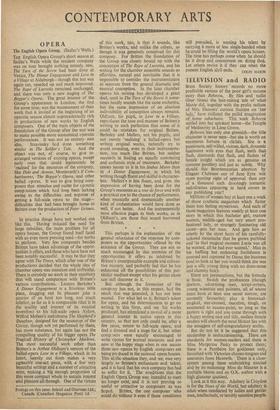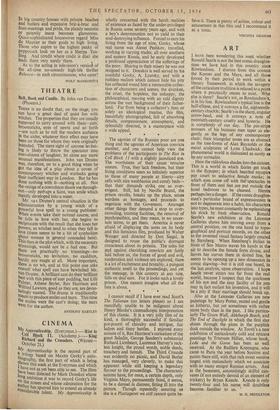TELEVISION and RADIO
BOOK Society history records no more profitable version of the poor girl's success story than Rebecca. By film and radio (four times) the hair-raising tale of what Maxie did, together with the prolix tedium of Mrs. Danvers' curious fixation on 'her lady,' have titillated the pallid imagination of homo suburbanis. This week Rebecca settled into her spiritual home—the Temple of Mediocrity in Lime Grove.
Rebecca has only one gimmick—the title character is never seen—but she is worth an enormous fortune in clichés. She is a passionate, self-willed, vicious, dark, dynamic fascinator with eyes that flash, teeth that flash, diamonds that flash, and flashes of female insight which are as genuine as costume jewellery and just as subtle. Why should this Brontemaurian abortion by Elegant Clubman out of Jane Eyre win more panting sighs of approval than any of a thousand such droolingly romantic melodramas appearing in hard covers in any publishing year?
Millions of women buy at least one a week of -those synthetic magazines which flatter them into feeling mysterious. And each of those magazines features weekly at least one story in which this bachelor girl, mature woman, middle-aged but very smart pro- fessional lady, or strangely fascinating old crone—gets her man. And gets him so utterly by the short hairs of his carefully- tailored moustache that he grows purblind and 'in that magical moment Lucia was all he wanted, all he had ever wanted.' Man in his baffling but endearing foolishness is coursed and captured by Diana the huntress (and to look at her you would think she was just a silly young thing with no dress-sense and clammy hair).
There are permutations, but the formula is basic. Switch the professions (though doctors, advertising men, script-writers, young scientists and painters, all of whom must have at least one secret sorrow, are currently favourite); play it historical- tragical, star-crossed, macabre, tough, or sweetened to nausea-point, so long as the pattern is right and you come through with a happy ending nice and tidy, endless female readers will absorb the most blatant lies with the smuggest of self-congratulatory smiles.
But do not let it be suggested that this readership is undiscriminating. There are standards for women-readers and there is Miss Margerina Pesky to protect them; there is a Pantheon for goddesses only, furnished with Victorian chaises-longues and souvenirs from Haworth. There is a class- system among these unshrinking narcissi and by its reckoning Miss du Maurier is a multiple bloom and an O.K. author with a high glamour quotient.
Look at it this way. Adultery in Croydon is for the News of the World, but adultery is adult when conducted by ladies and gentle- men, intellectuals; or terribly sensitive people. In big country -houses with private beaches and butlers and expensive bric-a-brac and hunt-meetings and pride, the plainly neurotic or patently inane becomes glamorous. Quasi-sophisticated housewives regard Miss du Maurier as their guide to high living. Those who aspire to the highest peaks of Poppycock look on her as a Sherpa Ten- Sing. And (credit where credit is due) she leads them very surely there.
As to the acting in television's versioi% of the all-time no-comedy high-life thriller Rebecca—in such circumstances, who cares?
WOLF MANKOWITZ



































 Previous page
Previous page